小学英语一般过去时讲解及练习
- 格式:docx
- 大小:25.87 KB
- 文档页数:5
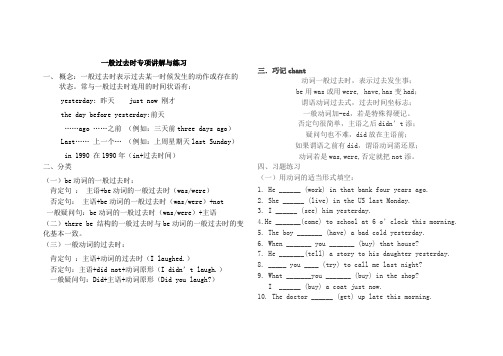
一般过去时专项讲解与练习一、概念:一般过去时表示过去某一时候发生的动作或存在的状态。
常与一般过去时连用的时间状语有:yesterday; 昨天 just now 刚才the day before yesterday;前天……ago ……之前(例如:三天前three days ago)Last…… 上一个… (例如:上周星期天last Sunday)in 1990 在1990年(in+过去时间)二、分类(一)be动词的一般过去时:肯定句:主语+be动词的一般过去时(was/were)否定句:主语+be动词的一般过去时(was/were)+not一般疑问句:be动词的一般过去时(was/were)+主语(二)there be 结构的一般过去时与be动词的一般过去时的变化基本一致。
(三)一般动词的过去时:肯定句:主语+动词的过去时(I laughed.)否定句:主语+did not+动词原形(I didn’t laugh.)一般疑问句:Did+主语+动词原形(Did you laugh?)三.巧记chant动词一般过去时,表示过去发生事;be用was或用were, have,has变had;谓语动词过去式,过去时间坐标志;一般动词加-ed,若是特殊得硬记。
否定句很简单,主语之后didn’t添;疑问句也不难,did放在主语前;如果谓语之前有did,谓语动词需还原;动词若是was,were,否定就把not添。
四、习题练习(一)用动词的适当形式填空:1. He ______ (work) in that bank four years ago.2. She ______ (live) in the US last Monday.3. I ______ (see) him yesterday.4.He _______(come) to school at 6 o’clock this morning.5. The boy _______ (have) a bad cold yesterday.6. When _______ you _______ (buy) that house?7. He _______(tell) a story to his daughter yesterday.8. _____ you ____ (try) to call me last night?9. What _______you _______ (buy) in the shop?I ______ (buy) a coat just now.10. The doctor ______ (get) up late this morning.11. She ________ (paint) the wall last month.12. My mother _______ (be) a worker 20 years ago.13. ________ (be) you here just now?No, I ________ (be not) here.14. Why _______ your brother _______ (cry) last night?15. It ______(be) my mother’s birthday yesterday.(二)翻译下列句子:1.我上周去看爷爷和奶奶了。
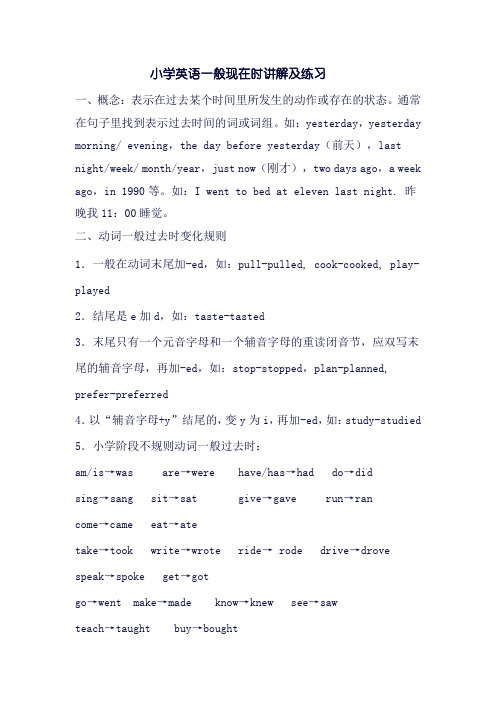
小学英语一般现在时讲解及练习一、概念:表示在过去某个时间里所发生的动作或存在的状态。
通常在句子里找到表示过去时间的词或词组。
如:yesterday,yesterday morning/ evening,the day before yesterday(前天),last night/week/ month/year,just now(刚才),two days ago,a week ago,in 1990等。
如:I went to bed at eleven last night. 昨晚我11:00睡觉。
二、动词一般过去时变化规则1.一般在动词末尾加-ed,如:pull-pulled, cook-cooked, play- played2.结尾是e加d,如:taste-tasted3.末尾只有一个元音字母和一个辅音字母的重读闭音节,应双写末尾的辅音字母,再加-ed,如:stop-stopped,plan-planned, prefer-preferred4.以“辅音字母+y”结尾的,变y为i,再加-ed,如:study-studied 5.小学阶段不规则动词一般过去时:am/is→was are→were have/has→had do→didsing→sang sit→sat give→gave run→rancome→came eat→atetake→took write→wrote ride→ rode drive→drove speak→spoke get→gotgo→went make→made know→knew see→sawteach→taught buy→boughtread→read pu t→put hurt→hurt cut→cutfall→fell say→said三、句式变化(1) Be动词在一般过去时中的变化① am 和is在一般过去时中变为was。
(was not=wasn’t)② are在一般过去时中变为were。
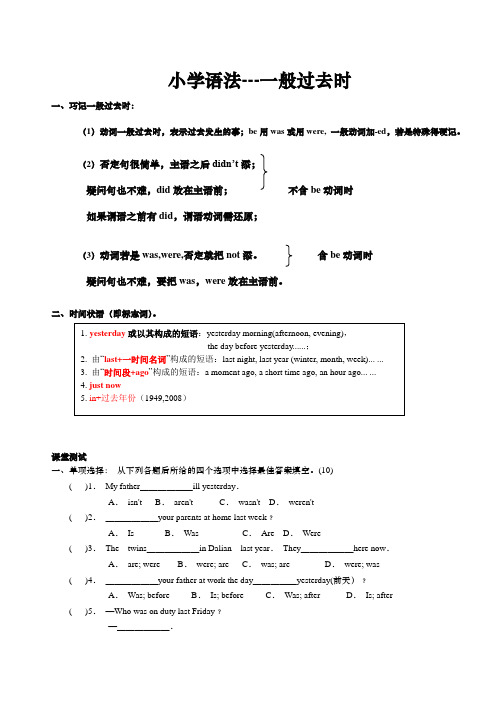
小学语法---一般过去时一、巧记一般过去时:(1)动词一般过去时,表示过去发生的事;be用was或用were, 一般动词加-ed,若是特殊得硬记。
(2)否定句很简单,主语之后didn’t添;疑问句也不难,did放在主语前;不含be动词时如果谓语之前有did,谓语动词需还原;(3)动词若是was,were,否定就把not添。
含be动词时疑问句也不难,要把was,were放在主语前。
二、时间状语(即标志词)。
1.yesterday或以其构成的短语:yesterday morning(afternoon, evening),the day before yesterday......;2. 由“last+一时间名词”构成的短语:last night, last year (winter, month, week)... ...3. 由“时间段+ago”构成的短语:a moment ago, a short time ago, an hour ago... ...4. just now5. in+过去年份(1949,2008)课堂测试一、单项选择:从下列各题后所给的四个选项中选择最佳答案填空。
(10)( )1.My father______ill yesterday.A.isn't B.aren't C.wasn't D.weren't( )2.______your parents at home last week﹖A.Is B.Was C.Are D.Were( )3.The twins______in Dalian last year.They______here now.A.are; were B.were; are C.was; are D.were; was ( )4.______your father at work the day_____yesterday(前天)﹖A.Was; before B.Is; before C.Was; after D.Is; after ( )5.—Who was on duty last Friday﹖—______.A.I am B.I was C.Yes, I was D.No, I wasn't ( )6. I cleaned my classroom ___________.A with three hoursB three hours agoC in three hoursD three hours before( ) 7. I came _______ my house two days ago .A back onB back toC to backD back( ) 8 . ___________? He did some reading at home.A What does your father do yesterday eveningB What does your brother do in the schoolC What did your brother do over the weekendD Where did your brother go last Sunday二、请用正确动词形式填空。
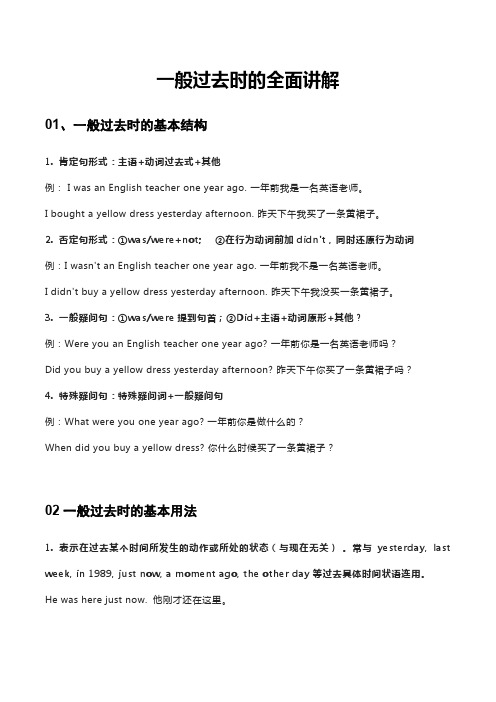
一般过去时的全面讲解01、一般过去时的基本结构1. 肯定句形式:主语+动词过去式+其他例: I was an English teacher one year ago. 一年前我是一名英语老师。
I bought a yellow dress yesterday afternoon. 昨天下午我买了一条黄裙子。
2. 否定句形式:①was/were+not; ②在行为动词前加didn't,同时还原行为动词例:I wasn't an English teacher one year ago. 一年前我不是一名英语老师。
I didn't buy a yellow dress yesterday afternoon. 昨天下午我没买一条黄裙子。
3. 一般疑问句:①was/were提到句首;②Did+主语+动词原形+其他?例:Were you an English teacher one year ago? 一年前你是一名英语老师吗?Did you buy a yellow dress yesterday afternoon? 昨天下午你买了一条黄裙子吗?4. 特殊疑问句:特殊疑问词+一般疑问句例:What were you one year ago? 一年前你是做什么的?When did you buy a yellow dress? 你什么时候买了一条黄裙子?02一般过去时的基本用法1. 表示在过去某个时间所发生的动作或所处的状态(与现在无关)。
常与yesterday, last week, in 1989, just now, a moment ago, the other day等过去具体时间状语连用。
He was here just now. 他刚才还在这里。
What did you do yesterday? 你昨天做了什么事?2. 在过去一段时间内的经常性或习惯性动作。

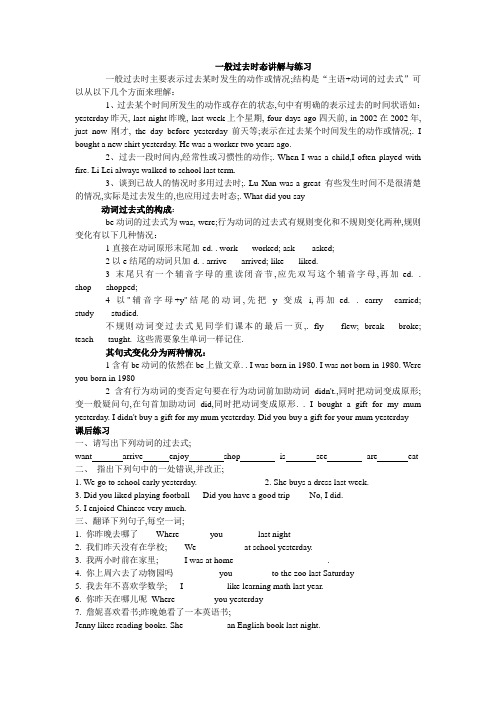
一般过去时态讲解与练习一般过去时主要表示过去某时发生的动作或情况;结构是“主语+动词的过去式”可以从以下几个方面来理解:1、过去某个时间所发生的动作或存在的状态,句中有明确的表示过去的时间状语如:yesterday昨天, last night昨晚, last week上个星期, four days ago四天前, in 2002在2002年, just now刚才, the day before yesterday前天等;表示在过去某个时间发生的动作或情况;. I bought a new shirt yesterday. He was a worker two years ago.2、过去一段时间内,经常性或习惯性的动作;. When I was a child,I often played with fire. Li Lei always walked to school last term.3、谈到已故人的情况时多用过去时;. Lu Xun was a great 有些发生时间不是很清楚的情况,实际是过去发生的,也应用过去时态;. What did you say动词过去式的构成:be动词的过去式为was, were;行为动词的过去式有规则变化和不规则变化两种,规则变化有以下几种情况:1直接在动词原形末尾加-ed. . work-----worked; ask------asked;2以e结尾的动词只加-d. . arrive-----arrived; like-----liked.3末尾只有一个辅音字母的重读闭音节,应先双写这个辅音字母,再加-ed. . shop-----shopped;4以"辅音字母+y"结尾的动词,先把y变成i,再加-ed. . carry----carried; study------studied.不规则动词变过去式见同学们课本的最后一页,. fly------flew; break-----broke; teach-----taught. 这些需要象生单词一样记住.其句式变化分为两种情况:1含有be动词的依然在be上做文章. . I was born in 1980. I was not born in 1980. Were you born in 19802含有行为动词的变否定句要在行为动词前加助动词didn't.,同时把动词变成原形; 变一般疑问句,在句首加助动词did,同时把动词变成原形. . I bought a gift for my mum yesterday. I didn't buy a gift for my mum yesterday. Did you buy a gift for your mum yesterday课后练习一、请写出下列动词的过去式;want arrive enjoy shop is see are eat二、指出下列句中的一处错误,并改正;1. We go to school early yesterday. __________2. She buys a dress last week. ___________3. Did you liked playing football Did you have a good trip --- No, I did. _______5. I enjoied Chinese very much. _______三、翻译下列句子,每空一词;1. 你昨晚去哪了Where ______ you _______ last night2. 我们昨天没有在学校; We __________ at school yesterday.3. 我两小时前在家里; I was at home ______ _______ _______.4. 你上周六去了动物园吗_______ you ________ to the zoo last Saturday5. 我去年不喜欢学数学; I _________ like learning math last year.6. 你昨天在哪儿呢Where ________ you yesterday7. 詹妮喜欢看书;昨晚她看了一本英语书;Jenny likes reading books. She _________ an English book last night.8. 上周六他做什么了他和妈妈去购物了;--- What ________ he _________ last Saturday--- He _________ shopping with his mother.9. 雷锋经常帮助其他人; Lei Feng often ________ other people.10. 我上周没有给你写信; I ________ ________ to you last week.Ⅲ按照括号中的要求改写句子;1. Lucy did her homework at home.改否定句Lucy ___________ ___________ her homework at home.2. She found some meat in the fridge.变一般疑问句___________ she __________ ___________ meat in the fridge3. She stayed there for a week.对划线部分提问__________ ___________ __________ she __________ there4. There was some orange in the cup.变一般疑问句_________ there ___________ orange in the cup5. Li Ming is at school now. 用yesterday 改写句子Li Ming _______ at school yesterday.四、请用正确动词形式填空;1. I _________ an exciting party last weekend. have2. She _______ at home yesterday morning. is3. Tommy __________ TV at his uncle’s last night.watch4. They all _________ to the mountains yesterday morning. go5. My friend, Carol, ________for the math test yesterday evening. study6 They____be on the farm a moment ago.7There____bea shop not long ago.8 Jenny____not goto bed until 11:00 o'clock last night.9 Danny _____read English five minutes ago.10 I _____seeLi Lei ____go out just now.11 He ____dohis homework every day. But he __not doit yesterday.12When I was young, I _____playgames with my friends.13When ____you_____writethis book I _____it last year.14 Did he____have lunch at home五、按照括号中的要求改写句子;11. Lucy did her homework at home.改否定句Lucy ___________ ___________ her homework at home.12. She found some meat in the fridge.变一般疑问句___________ she __________ ___________ meat in the fridge13. She stayed there for a week.对划线部分提问__________ ___________ __________ she __________ there14. There was some orange in the cup.变一般疑问句_________ there ___________ orange in the cup15. Li Ming is at school now. 用yesterday 改写句子Li Ming _______ at school yesterday. 要点攻略牢记四个四,学好过去时在这一单元学习中,我们将要学习一种新的时态,那就是一般过去时;那么该如何正确运用这种时态呢没关系,请记好我帮你总结的四个四,相信你能够了解并能熟练地运用了;四种用法①表示在过去某个时间发生的动作或情况;例如:I went to school at 7:00 yesterday morning.我昨天早晨七点去上学;②表示在过去某个时间存在的状态;例如:She was not at home last night.她昨晚八点没在家;③表示在过去经常或反复发生的动作,常和often经常、always总是、sometimes有时等表示频率的时间状语连用;例如:He often had lunch at school last month.他上个月经常在学校吃午饭;④表示已故的人所做的事情或情况;例如:Ba Jin wrote a lot of novels for us.巴金写了很多部小说;四种时间状语①yesterday及相关短语;例如:yesterday morning/afternoon/evening昨天上午/下午/晚上;②“last+时间状语”构成的短语;例如:last night/month/spring/year昨晚/上个月/去年春天/去年;③“一段时间+ago”组成的短语;例如:three days ago三天以前four years ago四年以前;④“介词+时间名词”组成的短语;例如:in 1999在1999年;on the morning of December 25th在12月25号早上;四种谓语动词的表现形式①be动词的过去式was、were.例如:She was a teacher five years ago.她五年前是一名教师;②行为动词的过去式,分为规则动词和不规则动词两种;规则动词的过去式的构成遵循以下四个规则:1直接在动词后加ed,例如:help-helped; want-wanted等;2以不发音的字母e结尾时,去掉e加ed 即直接加d ,例如:like-liked; use-used等;3以辅音字母y结尾时,把y变成i再加ed,例如:carry-carried; study-studied等;4以重读闭音节结尾,双写最后一个辅音字母再加ed,例如:stop-stopped; shop-shopped等;而不规则动词的过去式则需要我们认真下工夫去记了,例如:go-went; come-came; buy-bought等;③连系动词的过去式;例如:become-becameShe became angry.她生气了;④情态动词的过去式+动词原形;例如:I could swim at the age of five.我五岁时就会游泳了;四种句式的构成①一般过去时态的肯定句式“主语+动词过去式+其它”例如:Jenny bought a skirt yesterday.詹妮昨天买了一件短裙;②一般过去时态的否定句式“主语+didn’t+动词原形+其它”例如:Jenny didn’t buy a skirt yesterday.詹妮昨天没有买短裙;③一般过去时态的一般疑问句式“Did+主语+动词原形+其它”例如:Did Jenny buy a skirt yesterday詹妮昨天买短裙了吗④一般过去时态的特殊疑问句式“疑问词+did +主语+动词原形+其它”例如:What did Jenny buy yesterday詹妮昨天买了什么怎么样通过以上的讲解,你对一般过去时态有所了解并能够熟练地运用了吗希望你越学越进步一般过去时态集中训练营亲爱的同学们,从本单元的学习中,我们又学到了一种新的时态“一般过去时态”;你对它理解并掌握了吗敢不敢来到集中训练营中接受训练呢如果你够勇气的话,就请来吧一训练第一关:小小单词难不到我;请写出下列动词的过去式;wantarriveenjoyshopbuy_see_break_fall二训练第二关:生病的句子能奈我何请在仔细诊断每个句子后,把正确的句子写在横线上;1. We were go to school early yesterday.___________________________________________2. She was buy a dress last week. ___________________________________________3. Did you liked playing football ___________________________________________you have a good trip -No, I didn’t.___________________________________________5. We didn’t flew kites last month.___________________________________________三训练第三关:翻译句子我最棒;请将下列的汉语句子翻译成正确的英语;1 你昨晚去哪了_______________________________________我去了王府井的一家商店;_____________________________2 李明前天想给妈妈买件大衣,但他没有太多的钱;3 我们去年在南京玩得不快乐;___________________________________________参考答案一般过去时态集中训练营一训练第一关:小小单词难不到我;1. wanted2. arrived3. enjoyed4. shopped5. bought6. saw7. broke8. fell二训练第二关:生病的句子能奈我何1. We went to school early yesterday.2. She bought a dress last week.3. Did you like playing football4. -Did you have a good trip-Yes, I did / No, I didn’t.5. We didn’t fly kites last month.三训练第三关:翻译句子我最棒;1. Where did you go yesterday I went to a shop in Wangfujing Street.2. Li Ming wanted to buy a coat for his mother, but he didn’t have much money the day beforeyesterday.3. We didn’t have fun in Nanjing last year.点击语法——一般过去时补遗在上一期报纸中,我们了解了一般过去时态的基本用法和其他的基本常识;这一次呢,我们来聊聊有关一般过去时态的其他事项;1到底何时才用一般过去时态①句中有明确的表示过去的时间状语,表示在过去某个时间发生的动作或情况;如:I went to school at 7:00 yesterday morning.我昨天早晨七点去上学;②句中有明确的表示过去的时间状语,表示在过去某个时间存在的状态;如:She was not at home last night.她昨晚八点没在家;③表示在过去经常或反复发生的动作,常和often经常、always总是、sometimes有时等表示频率的时间状语连用;如:He often had lunch at school last month.他上个月经常在学校吃午饭;④表示已故的人所做的事情或情况;如:Ba Jin wrote a lot of novels for us.巴金写了很多部小说;2动词过去式后的ed到底发什么音规则动词过去式后的“ed”读音时不一样的;那么,有什么不一样呢有这么几句口诀:“清读清,浊读浊,元音结尾还读浊,/t/、/d/之后读/id/;”怎么样,理解吗听我娓娓道来:“清读清”,是指动词以清辅音结尾,那么加的“ed”读作清辅音/t/,如asked /a:skt/,missed /mist/等;动词以浊辅音或元音结尾,那么加的“ed”读作浊辅音/d/,如cleaned /kli;nd/,lived /livd/,played /pleid/等;动词以/t/或/d /结尾,那么加的“ed”读作浊辅音/id/,如started /sta:tid/,studied /sta:did/等;趁热打铁一般过去时态小练习Ⅰ请用正确动词形式填空;1. I _________ an exciting party last weekend.have2. She _______ at home yesterday morning.is3. Tommy __________ TV at his uncle’s last night.watch4. They all _________ to the mountains yesterday morning.go5. My friend, Carol, ________for the math test yesterday evening.studyⅡ翻译下列句子;6.你昨天在哪儿呢Where ________ you yesterday7.詹妮喜欢看书;昨晚她看了一本英语书;Jenny likes reading books. She _________ an English book last night.8.上周六他做什么了他和妈妈去购物了;--- What ________ he _________ last Saturday--- He _________ shopping with his mother.9.雷锋经常帮助其他人;Lei Feng often ________ other people.10.我上周没有给你写信;I ________ ________ to you last week.Ⅲ按照括号中的要求改写句子;11. Lucy did her homework at home.改否定句Lucy ___________ ___________ her homework at home.12. She found some meat in the fridge.变一般疑问句___________ she __________ ___________ meat in the fridge13. She stayed there fora week.对划线部分提问__________ ___________ __________ she __________ there14. There was some orange in the cup.变一般疑问句_________ there ___________ orange in the cup15. Li Ming is at school now.用yesterday改写句子Li Ming _______ at school yesterday.参考答案一般过去时小练习Ⅰ1. had2. was3. watched4. went5. studiedⅡ6. were7. read8. did, do, went9. helped10. didn’t writeⅢ11. didn’t do12. Did, find any13. How long did, stay14. Was any15. was。
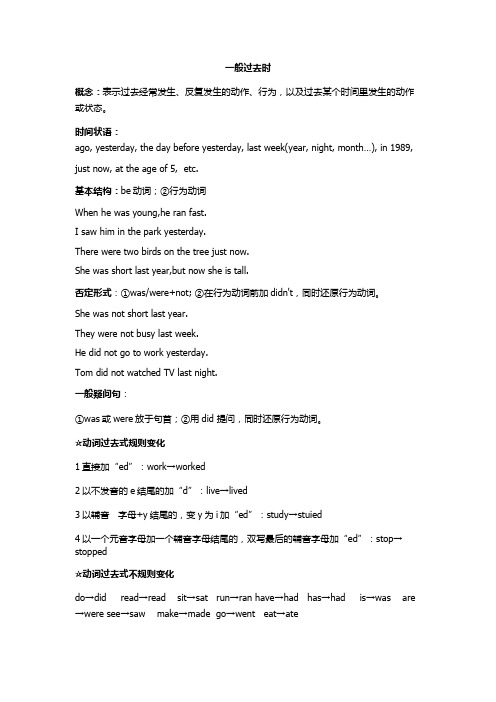
一般过去时概念:表示过去经常发生、反复发生的动作、行为,以及过去某个时间里发生的动作或状态。
时间状语:ago, yesterday, the day before yesterday, last week(year, night, month…), in 1989, just now, at the age of 5, etc.基本结构:be动词;②行为动词When he was young,he ran fast.I saw him in the park yesterday.There were two birds on the tree just now.She was short last year,but now she is tall.否定形式:①was/were+not; ②在行为动词前加didn't,同时还原行为动词。
She was not short last year.They were not busy last week.He did not go to work yesterday.Tom did not watched TV last night.一般疑问句:①was或were放于句首;②用did 提问,同时还原行为动词。
☆动词过去式规则变化1直接加“ed”:work→worked2以不发音的e结尾的加“d”:live→lived3以辅音字母+y结尾的,变y为i加“ed”:study→stuied4以一个元音字母加一个辅音字母结尾的,双写最后的辅音字母加“ed”:stop→stopped☆动词过去式不规则变化do→did read→read sit→sat run→ran have→had has→had is→was are →were see→saw make→made go→went eat→ate一般过去时的练习一、用所给的动词的适当形式填空。
⒈He ___________(visit) the Great Wall last year.2.We____________(have) a good time yesterday.3.We often __________(go) to school by bus last year.4.I __________(live)in the village when I was a child.5.Mike__________(see) a big tiger in the nature park last year.6.Sam___________ (do) the housework yesterday.7.________(do) you _________(enjoy) yourself yesterday?8.________(do)you __________(play) the violin in the artroom yesterday?9.I __________ (eat) a big pizza yesterday.10.There_________ (be) many sheep on the farm last year.11. I _________ (watch) a cartoon on Saturday.12. Her father __________ (read) a newspaper last night.13. We _________ to zoo yesterday, we ___________ to the park. (go)14. _________ you __________ (visit) your relatives last Spring Festival?15. _________ he __________ (fly) a kite on Sunday? Yes, he __________.二、单项选择( ) 1. She watered the flowers ________.A tomorrowB sometimesC yesterday morning( ) 2.What ____ Mike do last weekend ?A doB doesC did( ) 3. I ___ my room last Sunday.A cleanedB cleanC am cleaning( ) 4. _____ you _____ TV last night .A Do, watchB Did, watchC Did, watched( ) 5.---Did your father write an e-mail yesterday ?A Yes, he did.B Yes, he doesC No, he don’t( ) 6.They _____ on a trip in February ,2007.A are goingB goingC went( ) 7. ____ he ____ football two days ago?A Does , playB Did , playedC Did , play三、Be动词的过去时练习(一)用be动词的适当形式填空。
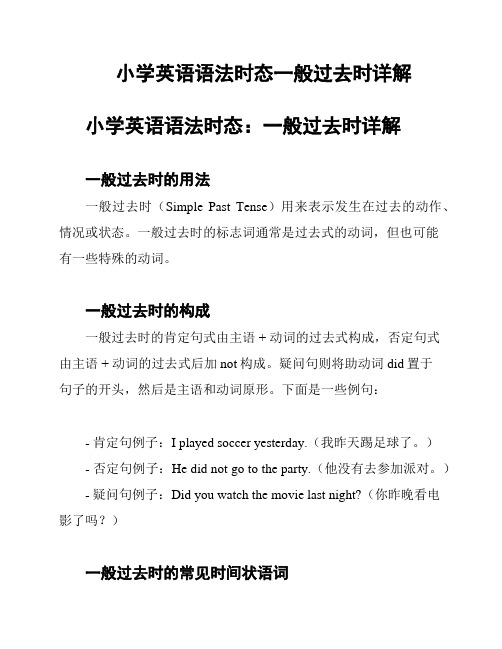
小学英语语法时态一般过去时详解小学英语语法时态:一般过去时详解一般过去时的用法一般过去时(Simple Past Tense)用来表示发生在过去的动作、情况或状态。
一般过去时的标志词通常是过去式的动词,但也可能有一些特殊的动词。
一般过去时的构成一般过去时的肯定句式由主语 + 动词的过去式构成,否定句式由主语 + 动词的过去式后加not构成。
疑问句则将助动词did置于句子的开头,然后是主语和动词原形。
下面是一些例句:- 肯定句例子:I played soccer yesterday.(我昨天踢足球了。
)- 否定句例子:He did not go to the party.(他没有去参加派对。
)- 疑问句例子:Did you watch the movie last night?(你昨晚看电影了吗?)一般过去时的常见时间状语词一般过去时通常会和一些时间状语词一起使用,以明确动作发生的具体时间。
以下是一些常见的时间状语词:- yesterday(昨天)- last week(上周)- two days ago(两天前)- in 1998(在1998年)一般过去时的特殊用法一般过去时有一些特殊的用法需要注意:1. 表示过去经常性的动作或惯。
例如:When I was young, I played soccer every day.(当我年轻时,我每天都踢足球。
)2. 表示过去事实或真理。
例如:The earth revolved around the sun.(地球绕太阳转。
)总结一般过去时用来描述发生在过去的动作、情况或状态。
它的构成简单,使用过去式的动词作为标志词。
通过加入时间状语词,可以更明确地指出动作发生的具体时间。
同时,一般过去时还有一些特殊的用法,需要灵活运用。
>注意:本文内容仅供参考,具体使用时请根据实际情况和教材要求进行调整。
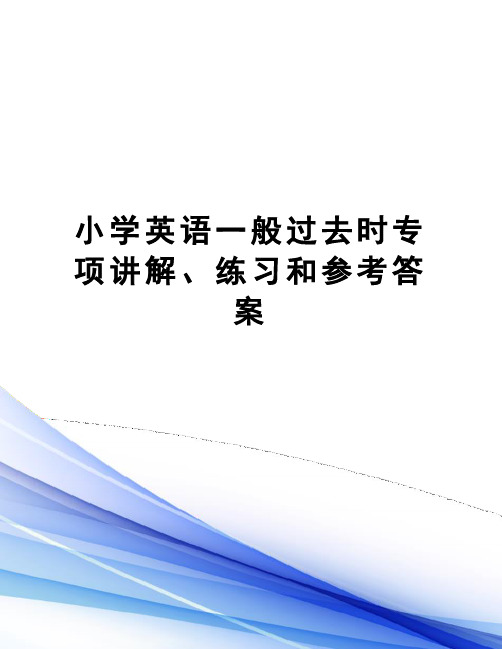
小学英语一般过去时专项讲解、练习和参考答案一般过去时专项讲解与练习一、概念:一般过去时表示过去某一时候发生的动作或存在的状态。
常与一般过去时连用的时间状语有:yesterday; 昨天just now刚才the day before yesterday;前天⋯⋯ago ⋯⋯之前(例如:三天前 three days ago )Last ⋯⋯上一个⋯(例如:上周星期天last Sunday )in 1990在1990年(in+过去时间)二、分类(一) be 动词的一般过去时:肯定句:主语 +be 动词的一般过去时( was/were)否定句:主语+be动词的一般过去时(was/were)+not一般疑问句: be 动词的一般过去时( was/were )+主语(二) there be结构的一般过去时与be 动词的一般过去时的变化基本一致。
(三)一般动词的过去时:肯定句:主语 +动词的过去时( I laughed.)否定句:主语 +did not+ 动词原形( I didn’t laugh.)一般疑问句: Did+主语 +动词原形( Did you laugh?)三.巧记 chant动词一般过去时,表示过去发生事;be 用 was 或用 were, have,has变had;谓语动词过去式,过去时间坐标志;一般动词加 -ed ,若是特殊得硬记。
否定句很简单,主语之后didn ’ t 添;疑问句也不难, did 放在主语前;如果谓语之前有 did ,谓语动词需还原;动词若是 was,were, 否定就把 not 添。
四、习题练习(一)用动词的适当形式填空:1.He ______ (work) in that bank four years ago.2.She ______ (live) in the US last Monday.3.I ______ (see) him yesterday.4.He _______(come) to school at 6 o’clock this morning.5.The boy _______ (have) a bad cold yesterday.6.When _______ you _______ (buy) that house?7.He _______(tell) a story to his daughter yesterday.8._____ you ____ (try) to call me last night?9.What _______you _______ (buy) in the shop?I ______ (buy) a coat just now.10. The doctor ______ (get) up late this morning.11.She ________ (paint) the wall last month.12.My mother _______ (be) a worker 20 years ago.13.________ (be) you here just now?No, I ________ (be not) here.14.Why _______ your brother _______ (cry) last night?15.It ______(be) my mother’s birthday yesterday.(二)翻译下列句子:1.我上周去看爷爷和奶奶了。
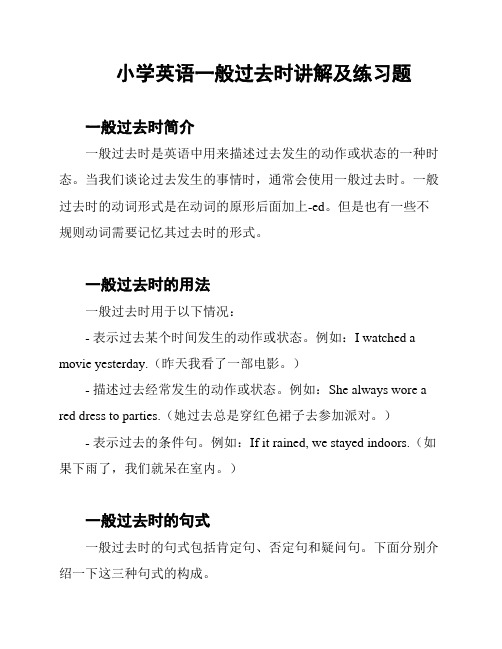
小学英语一般过去时讲解及练习题一般过去时简介一般过去时是英语中用来描述过去发生的动作或状态的一种时态。
当我们谈论过去发生的事情时,通常会使用一般过去时。
一般过去时的动词形式是在动词的原形后面加上-ed。
但是也有一些不规则动词需要记忆其过去时的形式。
一般过去时的用法一般过去时用于以下情况:- 表示过去某个时间发生的动作或状态。
例如:I watched a movie yesterday.(昨天我看了一部电影。
)- 描述过去经常发生的动作或状态。
例如:She always wore a red dress to parties.(她过去总是穿红色裙子去参加派对。
)- 表示过去的条件句。
例如:If it rained, we stayed indoors.(如果下雨了,我们就呆在室内。
)一般过去时的句式一般过去时的句式包括肯定句、否定句和疑问句。
下面分别介绍一下这三种句式的构成。
肯定句肯定句的构成很简单,只需要在动词后面加上-ed。
例如:I played soccer with my friends yesterday.(昨天我和朋友们一起踢足球。
)否定句构成否定句需要在动词前面加上助动词did和not。
例如:I did not watch TV last night.(昨晚我没有看电视。
)疑问句构成疑问句需要将助动词did放在句首,后面跟主语,然后加上动词原形。
例如:Did you eat breakfast this morning?(你今天早上吃早餐了吗?)练题请完成以下练题,用一般过去时填空。
1. They __________ (go) to the park yesterday.2. We __________ (play) soccer last weekend.3. She __________ (not watch) the movie with us.4. Did you __________ (see) the fireworks last night?答案:1. went2. played3. did not watch4. see。
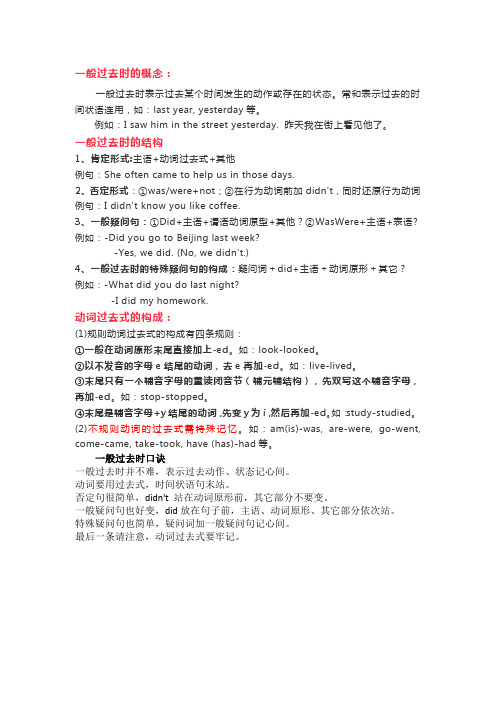
一般过去时的概念:一般过去时表示过去某个时间发生的动作或存在的状态。
常和表示过去的时间状语连用,如:last year, yesterday等。
例如:I saw him in the street yesterday. 昨天我在街上看见他了。
一般过去时的结构1、肯定形式:主语+动词过去式+其他例句:She often came to help us in those days.2、否定形式:①was/were+not;②在行为动词前加didn't,同时还原行为动词例句:I didn't know you like coffee.3、一般疑问句:①Did+主语+谓语动词原型+其他?②WasWere+主语+表语?例如:-Did you go to Beijing last week?-Yes, we did. (No, we didn't.)4、一般过去时的特殊疑问句的构成:疑问词+did+主语+动词原形+其它?例如:-What did you do last night?-I did my homework.动词过去式的构成:(1)规则动词过去式的构成有四条规则:①一般在动词原形末尾直接加上-ed。
如:look-looked。
②以不发音的字母e结尾的动词,去e再加-ed。
如:live-lived。
③末尾只有一个辅音字母的重读闭音节(辅元辅结构),先双写这个辅音字母,再加-ed。
如:stop-stopped。
④末尾是辅音字母+y结尾的动词,先变y为i,然后再加-ed。
如:study-studied。
(2)不规则动词的过去式需特殊记忆。
如:am(is)-was, are-were, go-went, come-came, take-took, have (has)-had等。
一般过去时口诀一般过去时并不难,表示过去动作、状态记心间。
动词要用过去式,时间状语句末站。
否定句很简单,didn't 站在动词原形前,其它部分不要变。
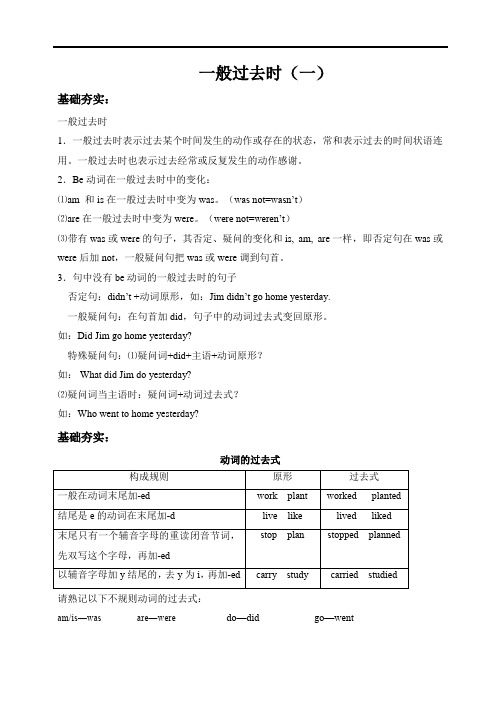
一般过去时(一)基础夯实:一般过去时1.一般过去时表示过去某个时间发生的动作或存在的状态,常和表示过去的时间状语连用。
一般过去时也表示过去经常或反复发生的动作感谢。
2.Be动词在一般过去时中的变化:⑴am 和is在一般过去时中变为was。
(was not=wasn’t)⑵are在一般过去时中变为were。
(were not=weren’t)⑶带有was或were的句子,其否定、疑问的变化和is, am, are一样,即否定句在was或were后加not,一般疑问句把was或were调到句首。
3.句中没有be动词的一般过去时的句子否定句:didn’t +动词原形,如:Jim didn’t go home yesterday.一般疑问句:在句首加did,句子中的动词过去式变回原形。
如:Did Jim go home yesterday?特殊疑问句:⑴疑问词+did+主语+动词原形?如: What did Jim do yesterday?⑵疑问词当主语时:疑问词+动词过去式?如:Who went to home yesterday?基础夯实:动词的过去式请熟记以下不规则动词的过去式:am/is—was are—were do—did go—wentcome—came swim—swam run—ran sing—sangdrink—drank give—gave begin—began win—wonhave—had get—got eat—ate sit--satfeel—felt sleep—slept sweep—swept leave—leftsee—saw draw—drew fly—flew blow—blewknow—knew throw—threw tell—told take—tookmake—made say—said ride—rode write—wroteput— put set—set hurt—hurt read—readbuy—bought teach—taught think—thought catch—caughtfight—fought bring—brought一般过去时的肯定陈述句一般过去时表示过去某个时间发生的动作或存在的状态,常用的时间状语有:yesterday , just now , last +时间, … ago , in 1980等。
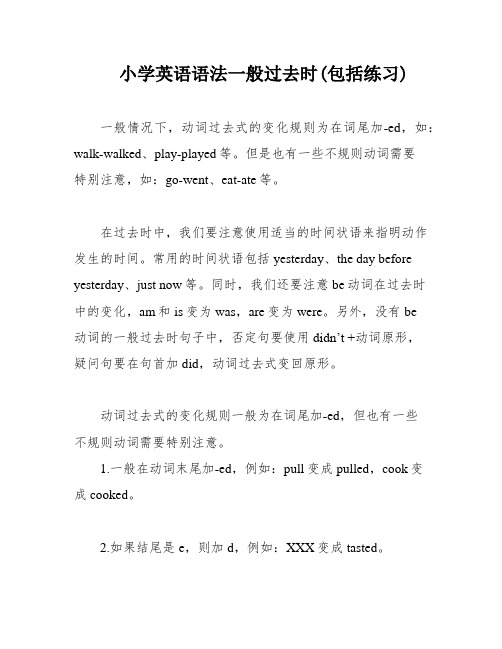
小学英语语法一般过去时(包括练习)一般情况下,动词过去式的变化规则为在词尾加-ed,如:walk-walked、play-played等。
但是也有一些不规则动词需要特别注意,如:go-went、eat-ate等。
在过去时中,我们要注意使用适当的时间状语来指明动作发生的时间。
常用的时间状语包括yesterday、the day before yesterday、just now等。
同时,我们还要注意be动词在过去时中的变化,am和is变为was,are变为were。
另外,没有be动词的一般过去时句子中,否定句要使用didn’t +动词原形,疑问句要在句首加did,动词过去式变回原形。
动词过去式的变化规则一般为在词尾加-ed,但也有一些不规则动词需要特别注意。
1.一般在动词末尾加-ed,例如:pull变成pulled,cook变成cooked。
2.如果结尾是e,则加d,例如:XXX变成tasted。
3.对于末尾只有一个元音字母和一个辅音字母的重读闭音节,应该双写末尾的辅音字母,再加-ed,例如:ped。
4.对于以“辅音字母+y”结尾的动词,需要变y为i,再加-ed,例如:study变成studied。
5.不规则动词过去式包括:am/is变成was,are变成were,begin变成began,speak变成spoke,swim变成swam,build变成built,spend变成spent,XXX变成took,buy变成bought,see变成saw,teach变成taught,run变成ran,stand变成stood,tell变成told,say变成said,sweep变成swept,think变成thought,will变成would,drive变成drove,know变成knew,write变成wrote,eat变成ate,learn变成learnt或learned,sing变成sang,feel变成felt,let变成let,sit变成sat,find变成found,make变成made,sleep变成slept,fly变成flew,mean变成meant,come变成came,ot,meet变成met,copy变成copied,get变成got,put变成put,do变成did,give变成gave,read变成read,draw变成drew,hear变成heard,ride变成rode,XXX变成drank,keep变成kept,ring变成rang。
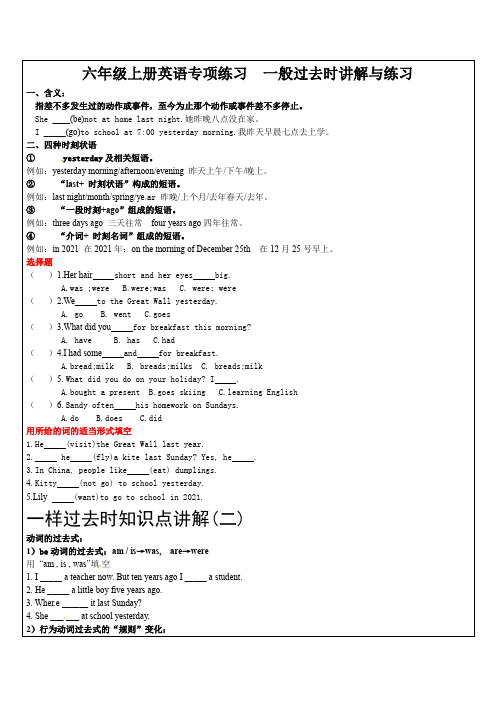
六年级上册英语专项练习一般过去时讲解与练习一、含义:指差不多发生过的动作或事件,至今为止那个动作或事件差不多停止。
She ____(be)not at home last night.她昨晚八点没在家。
I _____(go)to school at 7:00 yesterday morning.我昨天早晨七点去上学。
二、四种时刻状语①yesterday及相关短语。
例如:yesterday morning/afternoon/evening 昨天上午/下午/晚上。
②“last+ 时刻状语”构成的短语。
例如:last night/month/spring/ye ar 昨晚/上个月/去年春天/去年。
③“一段时刻+ago”组成的短语。
例如:three days ago 三天往常four years ago四年往常。
④“介词+ 时刻名词”组成的短语。
例如:in 2021 在2021年;on the morning of December 25th 在12月25号早上。
选择题()1.Her hair short and her eyes big.A.was ;wereB.were;wasC. were; were()2.We to the Great Wall yesterday.A. goB. wentC.goes()3.What did you for breakfast this morning?A. haveB. hasC.had()4.I had some and for breakfast.A.bread;milkB. breads;milksC. breads;milk()5.What did you do on your holiday? I .A.bought a presentB.goes skiingC.learning English()6.Sandy often his homework on Sundays.A.doB.doesC.did用所给的词的适当形式填空1.He (visit)the Great Wall last year.2. he (fly)a kite last Sunday? Yes, he .3.In China, people like (eat) dumplings.4.Kitty (not go) to school yesterday.5.Lily (want)to go to school in 2021.一样过去时知识点讲解(二)动词的过去式:1)be动词的过去式:am / is→was, are→were用“am , is , was”填空1. I _____ a teacher now. But ten years ago I _____ a student.2. He _____ a little boy five years ago.3. Wher e ______ it last Sunday?4. She ______ at school yesterday.2)行为动词过去式的“规则”变化:①一样动词,在词尾直截了当加ed,如:look→looked, work→worked②以不发音的e结尾的动词,直截了当加d,如:like→liked, live→lived③以辅音字母+y结尾的动词,变y为i,再加ed,如:study→studied, cry→cried④双写末尾字母,再加ed,如:stop→stopped, plan(打算)→planned, shop→shopped 3)行为动词过去式的“不规则”变化:而不规则动词的过去式则需认真下工夫去记了,例如:go-went; come-came; buy-bought等。
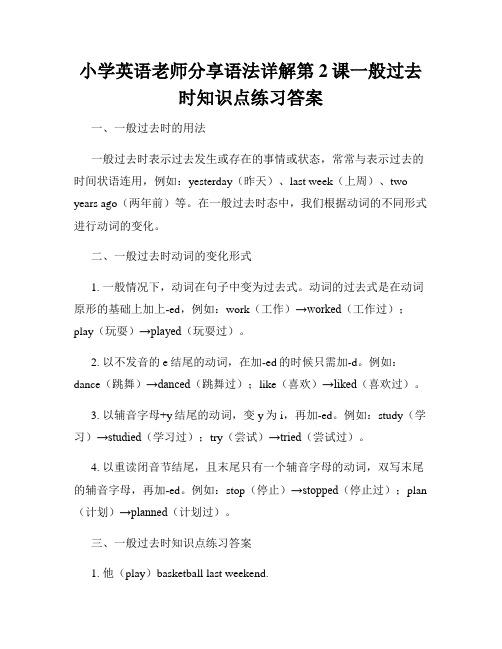
小学英语老师分享语法详解第2课一般过去时知识点练习答案一、一般过去时的用法一般过去时表示过去发生或存在的事情或状态,常常与表示过去的时间状语连用,例如:yesterday(昨天)、last week(上周)、two years ago(两年前)等。
在一般过去时态中,我们根据动词的不同形式进行动词的变化。
二、一般过去时动词的变化形式1. 一般情况下,动词在句子中变为过去式。
动词的过去式是在动词原形的基础上加上-ed,例如:work(工作)→worked(工作过);play(玩耍)→played(玩耍过)。
2. 以不发音的e结尾的动词,在加-ed的时候只需加-d。
例如:dance(跳舞)→danced(跳舞过);like(喜欢)→liked(喜欢过)。
3. 以辅音字母+y结尾的动词,变y为i,再加-ed。
例如:study(学习)→studied(学习过);try(尝试)→tried(尝试过)。
4. 以重读闭音节结尾,且末尾只有一个辅音字母的动词,双写末尾的辅音字母,再加-ed。
例如:stop(停止)→stopped(停止过);plan (计划)→planned(计划过)。
三、一般过去时知识点练习答案1. 他(play)basketball last weekend.答案:played2. 我们(watch)a movie yesterday.答案:watched3. 昨天他(visit)his grandparents.答案:visited4. Tom(help)his mother clean the house yesterday.答案:helped5. 上个月我(travel)to Beijing.答案:traveled6. 昨晚他们(have)a great time at the party.答案:had7. 我们(finish)our homework just now.答案:finished8. 上周我(read)a very interesting book.答案:read9. 他们(stay)at a hotel when they visited London.答案:stayed10. 昨天我的朋友(invite)me to his birthday party.答案:invited四、总结一般过去时是英语语法中的一个重要时态,它用来表示过去发生或存在的动作或状态。
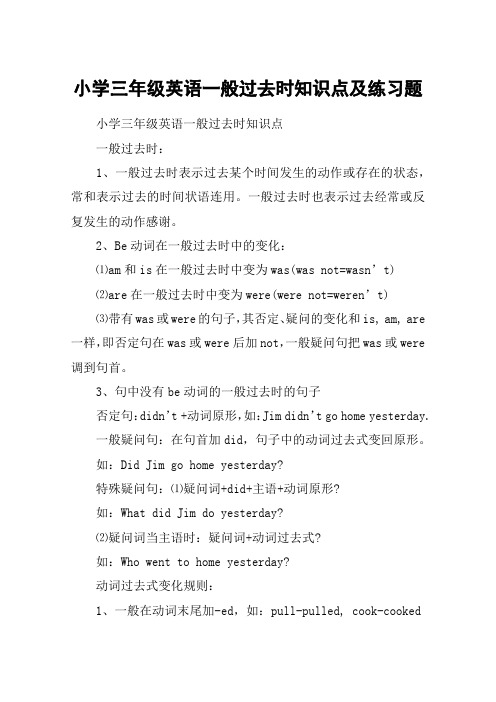
小学三年级英语一般过去时知识点及练习题小学三年级英语一般过去时知识点一般过去时:1、一般过去时表示过去某个时间发生的动作或存在的状态,常和表示过去的时间状语连用。
一般过去时也表示过去经常或反复发生的动作感谢。
2、Be动词在一般过去时中的变化:⑴am和is在一般过去时中变为was(was not=wasn’t)⑵are在一般过去时中变为were(were not=weren’t)⑶带有was或were的句子,其否定、疑问的变化和is, am, are 一样,即否定句在was或were后加not,一般疑问句把was或were 调到句首。
3、句中没有be动词的一般过去时的句子否定句:didn’t +动词原形,如:Jim didn’t go home yesterday.一般疑问句:在句首加did,句子中的动词过去式变回原形。
如:Did Jim go home yesterday?特殊疑问句:⑴疑问词+did+主语+动词原形?如:What did Jim do yesterday?⑵疑问词当主语时:疑问词+动词过去式?如:Who went to home yesterday?动词过去式变化规则:1、一般在动词末尾加-ed,如:pull-pulled, cook-cooked2、结尾是e加d,如:taste-tasted3、末尾只有一个元音字母和一个辅音字母的重读闭音节,应双写末尾的辅音字母,再加-ed,如:stop-stopped4、以“辅音字母+y”结尾的,变y为i,再加-ed,如:study-studied5、不规则动词过去式:am,is-was, are-were, do-did, see-saw, say-said, give-gave, get-got, go-went, come-came, have-had, eat-ate, take-took, run-ran, sing-sang, put-put, mak,e-made, read-read, write-wrote, draw-drew, drink-drank, fly-flew, ride-rode, speak-spoke, sweep-swept, swim-swam, sit-sat小学三年级英语一般过去时练习题一一、用be动词的适当形式填空1. I _______ an English teacher now.2. She _______ happy yesterday.3. They _______ glad to see each other last month.4. Helen and Nancy _______ good friends.5. The little dog _______ two years old this year.6. Look, there _______ lots of grapes here.7. There _______ a sign on the chair on Monday..8. Today _______ the second of June. Yesterday _______ the first of June. It _______ Children’s Day. All the students _______ very excited.二、句型转换1. There was a car in front of the house just now.否定句:______________________________________________一般疑问句:___________________________________________肯、否定回答:__________________________________________三、中译英1.我的故事书刚才还在手表旁边。
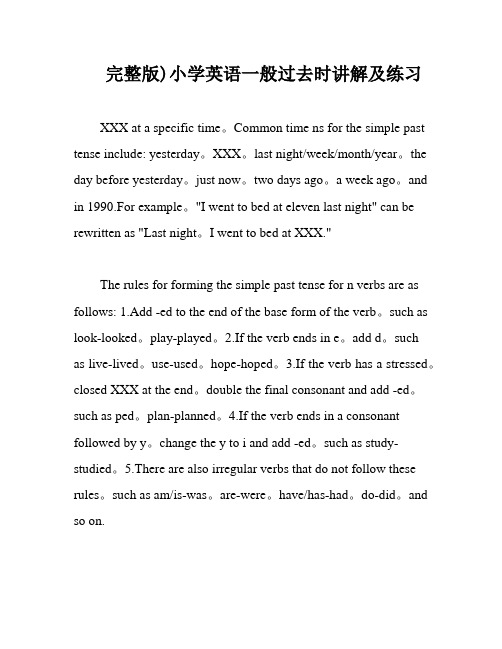
完整版)小学英语一般过去时讲解及练习XXX at a specific time。
Common time ns for the simple past tense include: yesterday。
XXX。
last night/week/month/year。
the day before yesterday。
just now。
two days ago。
a week ago。
and in 1990.For example。
"I went to bed at eleven last night" can be rewritten as "Last night。
I went to bed at XXX."The rules for forming the simple past tense for n verbs are as follows: 1.Add -ed to the end of the base form of the verb。
such as look-looked。
play-played。
2.If the verb ends in e。
add d。
suchas live-lived。
use-used。
hope-hoped。
3.If the verb has a stressed。
closed XXX at the end。
double the final consonant and add -ed。
such as ped。
plan-planned。
4.If the verb ends in a consonant followed by y。
change the y to i and add -ed。
such as study-studied。
5.There are also irregular verbs that do not follow these rules。
小学英语一般过去时讲解及练习Company number:【WTUT-WT88Y-W8BBGB-BWYTT-19998】六年级英语复习(第九课时)一般过去时概念:表示在过去某个时间里所发生的动作或存在的状态。
常见过去时态时间状语:Yesterday_________ yesterday morning/ evening________ last night/week/ month/year__________________________ the day before yesterday________just now_____________ two days ago_______a week ago__________in 1990______ 例:I went to bed at eleven last night. 昨晚我11:00睡觉。
行为动词一般过去时变化规则1.一般在动词原形末尾加-ed,如:look-looked, play- played2.结尾是e加d,如:live-lived,use-used,hope-hoped3.末尾只有一个元音字母和一个辅音字母的重读闭音节,应双写末尾的辅音字母,再加-ed,如:stop-stopped,plan-planned4.以“辅音字母+y”结尾的,变y为i,再加-ed,如:study-studied5.常见不规则动词一般过去时:am/is→was are→were have/has→had do→did sing→sangsit→sat give→gave run→ran come→came eat→atetake→took write→wroteride→ rode drive→drove s peak→spoke get→got go→went make→made know→knew see→saw teach→taughtbuy→bought read→read put→put hurt→hurt cut→cutfall→fell say→said句式变化(1) Be动词在一般过去时中的变化①am/is→_________________ 否定形式wasn’t(= was not)②are→__________________ 否定形式weren’t(= were not)③否定句在was或were后加_______,一般疑问句把was或were调到_____。
1.肯定句:主语+ was/ were+ 表语例:I was late yesterday. 昨天我迟到了。
2.否定句:主语+ was/ were + not + 表语例:We were not late yesterday.3.一般疑问句:Was/ Were+ 主语 + 表语例:Were you ill yesterday 你昨天病了吗肯定回答:Yes, I was. 否定回答:No,I wasn’t.4.特殊疑问句:特殊疑问词+ was/were +主语 +表语例:Where were you yesterday 你昨天在哪里练一练(1)她昨晚在家__________________________________________(2)她昨晚不在家。
______________________________________(3)她昨晚在家吗否定回答_______________________________(4)她什么时候在家昨晚__________________________________(5)上星期天下午他们在公园里____________________________________(6)上星期天下午他们不在在公园里_________________________________(7)上星期天下午他们在公园里吗_________________________________(8)上星期天下午他们在哪里____________________________________ (2)行为动词的一般过去时的句子(表动作)1. I watch TV every day.(一般现在时)→ I watched TV last night.(一般过去时)否定句:I didn’t watch TV last night.一般疑问句:Did you watch TV last night肯定回答: Yes, I did. 否定回答:No, I didn’t.特殊疑问句:What did you do last night2Jim does homework every 每天做家庭作业肯定句:__________________________________(Jim昨天做了家庭作业)否定句:___________________________________(Jim昨天做没做家庭作业)一般疑问句:___________________________(Jim昨天做没做家庭作业吗)肯定回答:________________ 否定回答:________________________特殊疑问句:___________________________________(Jim昨天做了什么)注意:在否定句和疑问句中动词过去式变回原形!练一练:(1)上星期他踢过足球。
_________________________________________(2)上星期他没有踢过足球。
_________________________________________(3)上星期他踢过足球吗肯定回答___________________________________(4)上星期他做了什么_________________________________________巩固练习题一、写出下列动词的过去式或动词原形。
1. go________2. is_____5. have ______6. watched ______7. ate________8. got_________9. lived _______ 10. saw __________ 11. do _________ 12. teach _______二、用单词的适当形式填空。
1. ________ you ________(water) the flowers yesterday.2. Su Hai _________(go) for a walk last Sunday.3. Mike didn’t ________(finish) his homework yesterday.4. I _______(is) ten years old last year.5. There ________(are) five books on the desk a moment ago.6. They ________(sweep) the floor just now.7. I _________ (meet) Miss White the day before yesterday.8. I _______ (wash) clothes last weekend.9. What did you you do on your holiday I ________ (go) swimming.三、选择正确的答案。
1. Danny _____ breakfast five times last week.A. eatB. ateC. eated2. Last Sunday____ Tree Planting Day.A. isB. wereC. was3. We ____ to the zoo and ___ a lot of animals yesterday.A. go; seeB. went; sawC. goes; sees4. What did you do last weekend --I _________A. read a bookB. wash the clothesC. go fishing5. What did you do on your holiday I ________A. bought a presentB. go skiingC. learn English6. What did he _____ yesterday He ____ his homework.A. did; didB. do; didC. do; do7. Yesterday my presents and I ____ our house.A. were cleaningB. cleanedC. are going to clean8. Last summer. I ____ in the lake and played on the beach.A. swimB. swamC. will swim9. Did you eat good food in China ______.A. Yes, I doB. No, I didn’tC. No, I did10. We played basketball _____.A. sometimesB. on SaturdaysC. last Saturday。